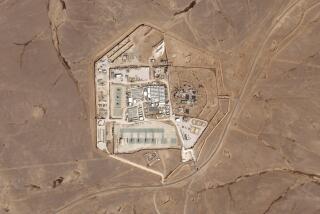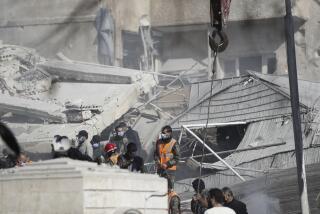Bush Urges U.N. Action Against Syria
- Share via
UNITED NATIONS — President Bush called on the U.N. Security Council on Friday to act quickly in response to a report that senior Syrian and Lebanese officials probably plotted the assassination of former Lebanese Prime Minister Rafik Hariri.
The U.N. report does not implicate Syrian President Bashar Assad, but it describes an August 2004 encounter in which he threatened Hariri, and cites a witness describing meetings among members of Assad’s inner circle in which the assassination was planned over the course of several months.
“The report strongly suggests that the politically motivated assassination could not have taken place without Syrian involvement,” Bush said after helping to dedicate a pavilion at the Ronald W. Reagan Presidential Library and Museum in Simi Valley.
Calling the report “deeply disturbing,” Bush said it “requires the world to look at it very carefully and respond accordingly.” He said he had asked Secretary of State Condoleezza Rice to urge the Security Council to convene immediately but did not describe what sort of action he had in mind.
France, with the support of the United States, is preparing a resolution that may urge sanctions against Syrian leaders implicated by the report, U.N. diplomats said Friday.
Syrian officials rejected the report as unfair and politically motivated. In Damascus, Syria’s capital, Information Minister Mahdi Dakhlallah said in a statement that the report “contradicts the simplest essential conditions and methods of investigation.”
Analysts said Syrians probably would rally around their government and resist foreign pressure. Opponents of Assad predicted that the report would be used for political purposes but added that the government eventually would have to provide details rather than just a blanket denial.
In Beirut, people largely stayed off the streets and kept their children home from school, fearing a violent backlash. But angry protesters gathered at Hariri’s grave, chanting, “Let the Syrians burn in hell!” and demanding the resignation of pro-Syrian President Emile Lahoud.
Many asserted that Lahoud’s days in office were numbered.
“He is a stubborn man, but he is isolated,” said Adnan Iskander, a former professor of political science at American University in Beirut. “I think popular and foreign pressure will force him out.”
The report was delivered to the Security Council on Thursday, and chief investigator Detlev Mehlis will brief the council Tuesday. Mehlis’ report strongly suggests the involvement of three senior Syrian officials and a Lebanese security official, but he deleted their names hours before the report was released.
He denied being pressured by U.N. Secretary-General Kofi Annan or anyone else, saying he dropped the names after learning that the report would be circulated beyond the Security Council. Mehlis called the witness’ claim credible but said it had not been corroborated and “it could give the wrong impression” of guilt.
“None of these changes were influenced by anyone,” Mehlis said.
A word-processing tool revealed the changes made to the publicly released version, showing that key suspects in Hariri’s February killing included Assad’s brother Maher; his brother-in-law and head of Syrian military intelligence, Asef Shawkat; and his close friend Bahjat Suleyman, along with a Lebanese ally, former security chief Jamil Sayyed.
Mehlis reported that the Syrian government provided minimal cooperation. Investigators were not able to question witnesses privately, so their answers tended to be “uniform.” Several officials, including Foreign Minister Farouk Shareh, tried to mislead investigators with false statements, the report says.
The Security Council will consider a second report next week analyzing whether Syria has withdrawn all of its intelligence and military forces from Lebanon, as demanded by Resolution 1559, adopted in September 2004. If it has not done so, Syria could face further sanctions.
France will take the lead, as it did with Resolution 1559. The Bush administration, saying Syria has failed to crack down on insurgents who use the country as a base for attacking Iraq, has been trying to isolate Assad and force him to stop what it calls his meddling in neighboring states.
Britain also supports increasing pressure on Assad. “This report is very disturbing,” British Foreign Secretary Jack Straw said during a visit to Alabama with Rice. “It is further evidence of the extraordinary view that the Syrian elite have held that the Lebanon is a kind of fiefdom.... It is an unpleasant story which the international community will take very seriously indeed.”
Syrian state TV ignored the report for much of Friday, showing cooking and health programs.
“The report will be abused by the U.S. and the international community,” predicted Michel Kilo, a political analyst and government opponent. However, he said, the report now puts the burden on Assad’s government.
“In a courtroom, you can’t just show up and say, ‘I swear, I swear, I swear I am innocent,’ ” he said. “It’s the same thing here. You can’t just say, ‘I wasn’t involved.’ You have to prove it.”
*
Farley reported from the United Nations and Khalil from Cairo. Times staff writer Edwin Chen in Simi Valley and special correspondents Rania Abouzeid in Beirut and Jailan Zayan in Cairo contributed to this report.
More to Read
Sign up for Essential California
The most important California stories and recommendations in your inbox every morning.
You may occasionally receive promotional content from the Los Angeles Times.










